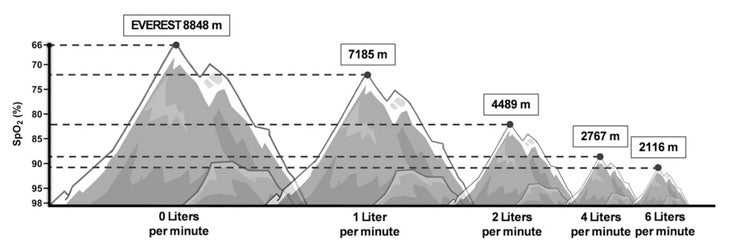An expedition that summited Everest in less than a week sparked interest—and skepticism—about the benefits of the gas

(Photo: Westend61/Getty)
Published September 15, 2025 01:28PM
In May, four British men climbed Mount Everest in an ultra-rapid expedition that took them from London to the summit and back in less than a week. The trip was organized by Lukas Furtenbach, an accomplished and sometimes controversial guide from Austria who has long sought to speed up Everest trips from their typical six- to eight-week duration. The breakthrough in this year’s expedition, according to media reports, was that the men inhaled xenon gas two weeks before they left in order to prepare their bodies for the rigors of high altitude.
The news prompted a flood of criticism, much of it focused on ethics and mountaineering culture. “Why not just fly up there in a helicopter and touch the top so you said you did it?” the American guide Garrett Madison asked. Those criticisms take for granted that xenon actually works—but scientists aren’t so sure. A new paper in the journal High Altitude Medicine & Biology takes a critical look at the claims and evidence for xenon as a mountaineering aid.
Why Might Xenon Help?
There are three possible ways that xenon might help you handle high altitudes: triggering artificial pre-adaptation to thin air, preventing altitude illness, and protecting your brain from damage caused by low oxygen levels. In the new paper, a team of researchers led by Andrew Luks of the University of Washington—the lead author of the Wilderness Medical Society’s guidelines on prevention and treatment of altitude illness, as it happens—evaluates each of these claims.
The main reason conventional Everest expeditions are so long is that your body gradually adapts to breathing air with lower levels of oxygen. Many of the changes are triggered by a set of proteins called “hypoxia-inducible factors,” or HIFs, which sense oxygen levels and whose discovery earned the 2019 Nobel Prize in Physiology or Medicine. One of the key changes is an increase in EPO, which triggers the production of red blood cells that ferry more oxygen from the lungs to the rest of the body.
There is indeed evidence that inhaling xenon can increase the activity of HIFs, and consequently increase levels of EPO in the blood. In a 2019 study, inhaling xenon for just two minutes increased EPO levels for up to eight days, albeit with plenty of variability between subjects. But this increase didn’t translate into any measurable increase in red blood cells or improvement in performance. Luks and his colleagues find it implausible that this slight bump in EPO would have any noticeable effect on altitude acclimatization.
The case for preventing altitude illness is even shakier. There are three main types: acute mountain sickness, which is the mildest and most common form and whose defining feature is headaches; high-altitude cerebral edema, which involves swelling in the brain; and high-altitude pulmonary edema, which involves swelling in the lungs. The last two are potentially fatal. There are no studies directly testing the idea that xenon prevents these conditions and no convincing theoretical reasons to think it should. And most importantly, given that the gas only stays in your body for a matter of hours, it’s unlikely that any hypothetical protective effect would still be there two weeks after you inhale the gas.
The idea of “neuroprotection” is the most intriguing. There have been a few studies in animals suggesting that taking xenon can help protect the brain from the injuries that occur when the flow of blood to the brain is suddenly stopped, like in a stroke, heart attack, or traumatic brain injury.
Leaving aside the question of whether those studies can be extrapolated to humans, Luks’s bigger objection to this claim is that stopping blood flow to the brain (as in, say, a stroke) is very different from the situation at altitude, where blood flow stays the same or even increases but the blood contains less oxygen. In the former case, physical damage is often caused when blood suddenly starts flowing again; in the latter case, the blood never stops flowing.
How Did They Climb Everest So Quicky, Then?
The fact remains that the British climbers really did summit in less than a week. Luks and his colleagues attribute that success to two more mundane factors. First, the climbers reportedly spent ten weeks before the expedition sleeping in altitude tents at simulated elevations of up to 23,000 feet (compared to Everest’s peak of just over 29,000 feet). There’s plenty of evidence that this really does trigger adaptations, for example enabling you to maintain higher levels of oxygen in your blood once you begin climbing and reducing the risk of altitude illness. Furtenbach has been using this technique with clients since 2017 for three-week Everest climbs.
The other aid is the generous use of supplemental oxygen while climbing. On the three-week expeditions, Furtenbach’s clients are each accompanied by two sherpas, so they have the capacity to carry plenty of spare oxygen. Here’s a chart showing the effective altitude based on levels of blood oxygen (SpO2), as a function of how much oxygen you flow through your breathing mask:

Using one liter of oxygen per minute drops the effective altitude from 8,848 to 7,185 meters; using two liters drops is to 4,489 meters, which is already below the elevation of base camp. These numbers assume you’re at rest; you need to inhale more oxygen to maintain your blood levels if you’re exercising. For example, doing light exercise while getting two liters per minute of oxygen bumps the effective altitude back up to 6,442 meters. The solution? Turn the oxygen up even higher. Furtenbach’s website promises “unlimited oxygen” with equipment capable of delivering up to eight liters per minute.
To Luks and his colleagues, these two factors—pre-acclimatization in altitude tents, then high levels of oxygen flow—are enough to explain how the one-week expedition succeeded. If that’s the case, it seems surprising that others haven’t tried the same thing. But perhaps it’s more a question of risk tolerance rather than technological breakthroughs.
What’s the Verdict?
It’s quite clear that xenon has not been shown to make Everest expeditions safer or faster—yet. I suspect even Furtenbach might acknowledge that he’s operating for now in the realm of scientific extrapolation and personal experimentation.
What’s more debatable is whether the idea is probable, or even plausible. To Luks, it’s not just that we’re waiting for better evidence. “My bet is that if those studies are done,” he told me, “it will show that xenon doesn’t do anything.” Benjamin Levine, a prominent sports scientist at UT Southwestern Medical Center who led the definitive 2019 study of xenon’s effects of EPO and blood levels that I mentioned above, is similarly skeptical. “There is not only no evidence, but no rationale for why xenon would work in this setting,” he says.
Levine worries that all the speculation about what xenon might (but probably doesn’t) do will lead others to begin experimenting with it. Similar to the recent controversy about athletes using carbon monoxide to boost performance, xenon also carries potentially serious risks. “We know for sure that xenon can hurt people,” he told me. “In our studies, we gave it with full support of a cardiac anesthesiologist, and still had some volunteers lose awareness and near loss of consciousness. Doing it in someone’s garage without medical support will for sure lead to a catastrophic outcome for somebody.”
The other risk, according to Luks, is that if you head to high altitude relying on the magic of xenon and copious supplemental oxygen to protect you, you’ll be in big trouble if, say, you’re pinned down by bad weather long enough that your oxygen runs low, or if something else goes wrong with your oxygen supply. The usual practice of spending weeks acclimating to the mountain will help protect you, at least temporarily, in that situation.
Of course, this last objection applies even if you’re not using xenon. Everyone who ventures to the summit of Everest while relying on oxygen faces an existential risk if the oxygen runs out. I’m pretty sure that this year’s controversy will spark a bunch of studies on xenon’s potential benefits for mountaineering. I’ll be curious to see what they find. But whatever the results, no lab studies will resolve the deeper philosophical debate about what risks are worth running to summit a mountain, what forms of aid are fair game, and what the whole enterprise is really about.
For more Sweat Science, join me on Threads and Facebook, sign up for the email newsletter, and check out my new book The Explorer’s Gene: Why We Seek Big Challenges, New Flavors, and the Blank Spots on the Map.
Source link









